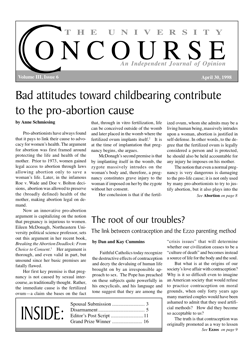What is our mission, really?
by Kathleen van Schaijik
Apropos of my concern that frequent, mandatory, one-on-one meetings between coordinators and RDs were bound to have a chilling effect on household life, a reader recently said to me, “I don’t see anything wrong with it; you’d have to show me evidence that the RDs were somehow abusing the confidentiality of the coordinators.”
A line in Dr. Miletic’s October article in favor of Distance Education degrees bothered me. He wrote: “As the Church prepares for the twenty-first century, so do we at Franciscan University prepare for a new Evangelization. Technology and the internet make it possible to fulfill our institutional mission of bringing the gospel to the ends of the earth.” Setting aside questions about whether or to what extent the gospel can be spread through technology, I want to protest the idea that it’s Franciscan University’s mission to bring the gospel to the ends of the earth.
It is the Church’s responsibility to evangelize the world. Each individual and institution within the Church has only a specific and limited part to play in this otherwise completely overwhelming mission. FUS’ part is to see to the higher education of the students entrusted to her care.
I may seem to be quibbling needlessly over terms, but there is something very practical at stake. If we think it’s our task to evangelize the whole world, we will spread ourselves far too thin. Instead of concentrating on giving the best possible formation to the students we have, we will think: “How can we get the rudiments out to the greatest number?” If we have the whole world in our sights, what we will chiefly notice about our own students is that they are exceptionally well-off—practically glutted with the Good News. So, rather than striving to provide a deeper, fuller, more excellent and rigorous education for them, we will throw our resources and creative energies behind efforts to come up with more efficient and further-reaching means of getting the basic message out to others—people normally beyond the range (intellectually, geographically, financially or otherwise) of an institution like ours.
But, in spreading ourselves too thin, we will make a poor job of our real mission. We will wind up short-changing our students—sending them out into the world imperfectly prepared for their own particular tasks within the Church, whether as artists, intellectuals, priests, parents, businessmen, or missionaries.


